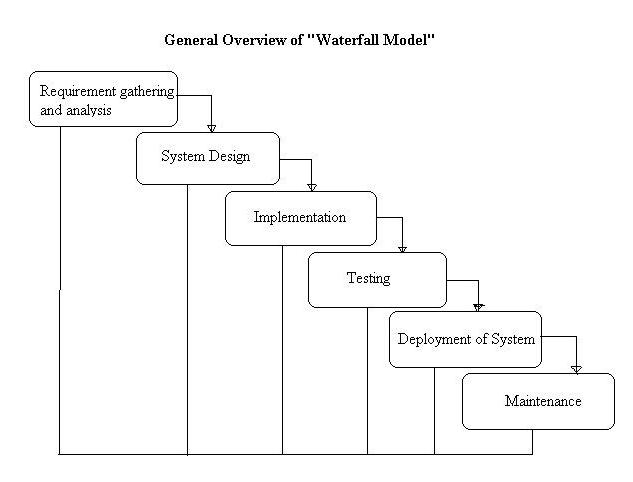Theoretical Paper
- Computer Organization
- Data Structure
- Digital Electronics
- Object Oriented Programming
- Discrete Mathematics
- Graph Theory
- Operating Systems
- Software Engineering
- Computer Graphics
- Database Management System
- Operation Research
- Computer Networking
- Image Processing
- Internet Technologies
- Micro Processor
- E-Commerce & ERP
Practical Paper
Industrial Training
Waterfall
The Waterfall Model was first Process Model to be introduced. It is also referred to as a linear-sequential life cycle model. It is very simple to understand and use. In a waterfall model, each phase must be completed fully before the next phase can begin. This type of model is basically used for the for the project which is small and there are no uncertain requirements. At the end of each phase, a review takes place to determine if the project is on the right path and whether or not to continue or discard the project. In this model the testing starts only after the development is complete. In waterfall model phases do not overlap.

Advantages of waterfall model:
- This model is simple and easy to understand and use.
- It is easy to manage due to the rigidity of the model – each phase has specific deliverables and a review process.
- In this model phases are processed and completed one at a time. Phases do not overlap.
- Waterfall model works well for smaller projects where requirements are very well understood.
Disadvantages of waterfall model:
- Once an application is in the testing stage, it is very difficult to go back and change something that was not well-thought out in the concept stage.
- No working software is produced until late during the life cycle.
- High amounts of risk and uncertainty.
- Not a good model for complex and object-oriented projects.
- Poor model for long and ongoing projects.
- Not suitable for the projects where requirements are at a moderate to high risk of changing.
When to use the waterfall model:
- This model is used only when the requirements are very well known, clear and fixed.
- Product definition is stable.
- Technology is understood.
- There are no ambiguous requirements
- Ample resources with required expertise are available freely
- The project is short.
Very less customer enter action is involved during the development of the product. Once the product is ready then only it can be demoed to the end users. Once the product is developed and if any failure occurs then the cost of fixing such issues are very high, because we need to update everywhere from document till the logic.

